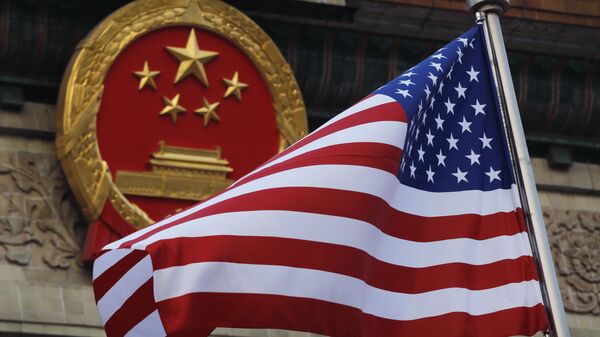Radio Sputnik discussed the Chinese economic performance in October with Loren Puette, director of market research at ChinaAg.
Sputnik: What are the reasons behind the Chinese economic performance in October that turned out to be better than anticipated?
Loren Puette: There's been a rush to get exports out before tariffs are potentially increased on the US side. So, there is a potential for roughly over 20 or 50 billion dollars of the tariffs that could be imposed by the US. So, Chinese exporters and businesses know that this is potentially on the horizon. They want to make sure that they get their goods out before that happens.
Sputnik: The midterms have actually been concluded, now there will be some sense of urgency to resolve this trade spat with China. I mean, I can probably understand the logic of not wanting to resolve it before the midterms vote, President Trump to show that he's got a very steely strong hand. Do you think there is going to be a focus now to get this negotiated settlement done and dusted and to move on? Because it's not going to do either economy much good after the end of this year when these trade tariffs kick in?
READ MORE: Ex-US Treasury Chief Paulson Warns of ‘Economic Iron Curtain' With China
Loren Puette: Yeah, well, the markets in the US reacted pretty strongly after the midterm results were announced. So, the markets, they had a positive outlook. What's interesting is at the end of November early December there will be the G20 Summit in Argentina and there are some expectations that, perhaps, if a breakthrough will occur, it will happen then. But in 2019 just roughly 7 months after that the G20 will be in Japan. So, there is a potential for it to drag into 2019. There is no rush, the US going to impose tariffs on Chinese goods for up to $250 billion; whereas on the Chinese side they could only import roughly $20 billion on US goods coming into their ports. So, the US will definitely take a slow approach. There is no rush on their end whereas on the Chinses side they would…, I mean, I am sure they would love to have this resolved and can just move on.
Sputnik: President Xi earlier spoke in favor of cutting import tariffs and opening of the economy obviously being focused on investment into the country and letting foreign companies participate into closed sectors, now would you imagine. How will that benefit China from your point of view?
Loren Puette: This is not unheard of to lower import tariffs. It's just better for importers in China because as their economy develops, they are going to become more of a processor of goods as opposed to just producing those raw products inside the country. What's interesting is that there is a lot of free trade agreements under negotiations. There's that one with Panama, they have one with Norway. They are looking to upgrade with Switzerland and Singapore. There is case studies where something positive can come out. It doesn't all have to be all doom and gloom.
Sputnik: What is the general take on the situation with regards to China now given this malice that we have had for 7 or 8 months now? Is there an expressed wish within the business circles within the USA to actually move this forward? I think China is wanting to get this situation resolved. What is your prognosis for this? Do you think this is going to really kick on and get settled within next 2 or 3 months, do you think? Or do you think really it's going to be one of those bloody-minded situations and it will just drag out?
Loren Puette: Unfortunately, I think it's probably just going to drag out. I mean, US companies in China have complained about intellectual property theft, about how they have to essentially establish joint ventures with the Chinese company and share all their data and process use with them. So, it's not a clear and transparent process. And what Xi Jinping mentioned in the China International Expo, basically lowering of tariffs is just one aspect of what needs to be done in order to resolve this issue. What's interesting, this is just speculation but there are other ways that China can hit back at the US and one way is potentially with the North Korean-US summit talks. Just this, during the midterms scheduled meeting between the Secretary of State of the US and his counterpart in North Korean, was postponed, [which was] kind of a surprise. So, there is speculation that maybe there is some pressure to postpone it. So, hopefully, it will be resolved but I still think over the next few months there is going to be a filling out and then maybe potentially in 2019 maybe at that G20 in Japan in June after a few months of this maybe cooler heads will prevail then.
READ MORE: Fearing Chinese Spying, US Research Institution Bars Visiting Foreign Scientists
Sputnik: Given the situation that America finds itself now in terms of the Congress being split between Democrats and Republicans is this good for the stock market? What's your particular take and your view with regards to the markets now moving forward?
Loren Puette: The markets reacted pretty well to the midterms. What's interesting is, in terms of the tariffs, that maybe there might be a little bit more of negotiation in the process of what is put forth, so that could help certain companies, particularly farmers in the Middle West which have been negatively impacted by the tariffs and basically lost their largest market for the goods. It really depends on the economic sector, but I would say in general it's pretty poor for US agriculture but for other markets it could be a positive. It just really depends.
The views and opinions expressed by the contributors do not necessarily reflect those of Sputnik.



